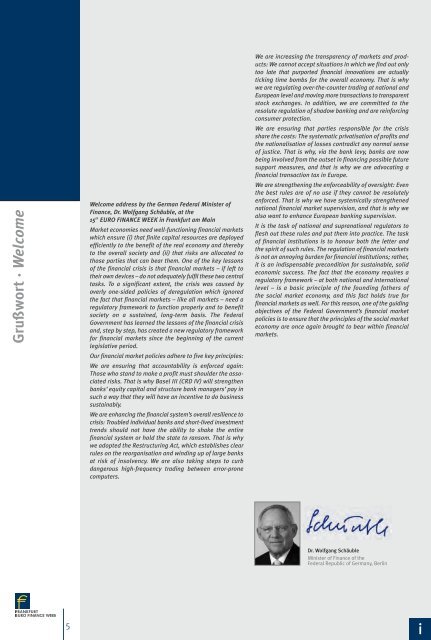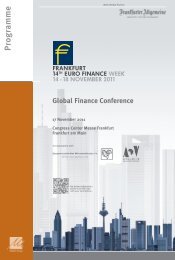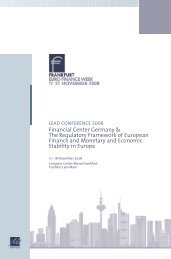Gesamtprogramm 2012 - Maleki Conferences GmbH
Gesamtprogramm 2012 - Maleki Conferences GmbH
Gesamtprogramm 2012 - Maleki Conferences GmbH
You also want an ePaper? Increase the reach of your titles
YUMPU automatically turns print PDFs into web optimized ePapers that Google loves.
Grußwort · Welcome<br />
5<br />
Welcome address by the German Federal Minister of<br />
Finance, Dr. Wolfgang Schäuble, at the<br />
15th EURO FINANCE WEEK in Frankfurt am Main<br />
Market economies need well-functioning financial markets<br />
which ensure (i) that finite capital resources are deployed<br />
efficiently to the benefit of the real economy and thereby<br />
to the overall society and (ii) that risks are allocated to<br />
those parties that can bear them. One of the key lessons<br />
of the financial crisis is that financial markets – if left to<br />
their own devices – do not adequately fulfil these two central<br />
tasks. To a significant extent, the crisis was caused by<br />
overly one-sided policies of deregulation which ignored<br />
the fact that financial markets – like all markets – need a<br />
regulatory framework to function properly and to benefit<br />
society on a sustained, long-term basis. The Federal<br />
Government has learned the lessons of the financial crisis<br />
and, step by step, has created a new regulatory framework<br />
for financial markets since the beginning of the current<br />
legislative period.<br />
Our financial market policies adhere to five key principles:<br />
We are ensuring that accountability is enforced again:<br />
Those who stand to make a profit must shoulder the associated<br />
risks. That is why Basel III (CRD IV) will strengthen<br />
banks’ equity capital and structure bank managers’ pay in<br />
such a way that they will have an incentive to do business<br />
sustainably.<br />
We are enhancing the financial system’s overall resilience to<br />
crisis: Troubled individual banks and short-lived investment<br />
trends should not have the ability to shake the entire<br />
financial system or hold the state to ransom. That is why<br />
we adopted the Restructuring Act, which establishes clear<br />
rules on the reorganisation and winding up of large banks<br />
at risk of insolvency. We are also taking steps to curb<br />
dangerous high-frequency trading between error-prone<br />
computers.<br />
We are increasing the transparency of markets and products:<br />
We cannot accept situations in which we find out only<br />
too late that purported financial innovations are actually<br />
ticking time bombs for the overall economy. That is why<br />
we are regulating over-the-counter trading at national and<br />
European level and moving more transactions to transparent<br />
stock exchanges. In addition, we are committed to the<br />
resolute regulation of shadow banking and are reinforcing<br />
consumer protection.<br />
We are ensuring that parties responsible for the crisis<br />
share the costs: The systematic privatisation of profits and<br />
the nationalisation of losses contradict any normal sense<br />
of justice. That is why, via the bank levy, banks are now<br />
being involved from the outset in financing possible future<br />
support measures, and that is why we are advocating a<br />
financial transaction tax in Europe.<br />
We are strengthening the enforceability of oversight: Even<br />
the best rules are of no use if they cannot be resolutely<br />
enforced. That is why we have systemically strengthened<br />
national financial market supervision, and that is why we<br />
also want to enhance European banking supervision.<br />
It is the task of national and supranational regulators to<br />
flesh out these rules and put them into practice. The task<br />
of financial institutions is to honour both the letter and<br />
the spirit of such rules. The regulation of financial markets<br />
is not an annoying burden for financial institutions; rather,<br />
it is an indispensable precondition for sustainable, solid<br />
economic success. The fact that the economy requires a<br />
regulatory framework – at both national and international<br />
level – is a basic principle of the founding fathers of<br />
the social market economy, and this fact holds true for<br />
financial markets as well. For this reason, one of the guiding<br />
objectives of the Federal Government’s financial market<br />
policies is to ensure that the principles of the social market<br />
economy are once again brought to bear within financial<br />
markets.<br />
Dr. Wolfgang Schäuble<br />
Minister of Finance of the<br />
Federal Republic of Germany, Berlin<br />
i

















